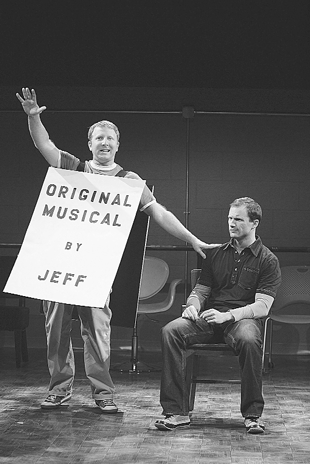The clouds are far behind Hunter Bell and Jeff Bowen
They’re young, gay, smart, and passionate about musicals—as are many men who try to take on New York and the theater. What sets Hunter Bell and Jeff Bowen apart is that they’ve channeled their assets—and a whole lot of talent—into one of the most charming musicals of the season.
“[title of show]” began at the New York Musical Theater Festival, and was picked up by the Vineyard as part of it subscription series. The show is about two guys writing a musical about two guys writing a musical, abetted by their friends Heidi Blickenstaff and Susan Blackwell.
It works because it doesn’t pretend to be anything else; it’s never less than honest. The framework is about creating an original musical—one not based on a movie, book, or play—that will be a “story worth telling.” Light, breezy, and hilariously self-deprecating, the show is full of references to obscure musicals of the past—like “Kwamina” and “Starlight Express.” A handout is available that explains the terms used in the show to the theatrically uninitiated. While that adds to the fun, it isn’t really necessary because the show is not about a laundry list of musicals, nor is it inside baseball for show queens. Rather, “[title of show],” or “TOS” as they like to call it, is about having a dream, struggling to make it real, and facing the challenges along the way. For every bit of witty dialogue, there is a vulnerable human heart that beats throughout this musical. The company is so talented that even on repeat viewings, the experience can be incredibly moving. As Bell says, it’s about “what you create and why you create,” and that’s something that resonates to all kinds of audiences.
The success of the show has brought Bell and Bowen a level of notoriety and entrée into the world of the theater they had only dreamed of. They note that experiences like having Terrence McNally write the liner notes for their cast recording—and just having a cast recording—have made them mindful of the doors their success has opened for them. They tell the story of John Kander coming backstage to meet them after a performance and saying that he and Fred Ebb had struggled with the argument about whether “sweeter” rhymes with “theater”—two syllables versus three—in their writing. As Bell says, “it rocks my world and blows my mind that this show has allowed me to have discussions with people like John Kander,” and he notes he has evolved from outsider to “half stalker-fan/half peer.” At the same time, Bowen added, “There’s still something of being outside looking in, which we always will be because in the theater there’s always more inside to go to get to the real center of the theater world.”
It is just this spirit of questioning what they’re about and wondering if they’re inside, outside, or enough that gives the show its poignancy. The struggle to find something that is true to put on the stage is a key element of Bell and Bowen’s work. It informs such numbers as “Die, Vampire, Die!” which is all about confronting the negativity and self-doubt many artists face, and the joy of suddenly finding yourself doing exactly what you want to do, as expressed in the lyrical ballad “The Way Back to Then.”
The show is playing to packed houses and defying easy categorization in terms of audience. Bell and Bowen express surprise and pleasure at the diversity of the audiences; while there may be a matinee full of seniors who are theater fans that have seen all the old musicals mentioned, it’s just as likely to have a house full of young professionals who relate to the struggle of “Two Nobodies in New York,” the second number in the show, as they try to make their mark in their chosen career.
Undoubtedly, Bell and Bowen are making theirs, and with the incredibly talented Blickenstaff and Blackwell filling out the company, one can’t help but be drawn into their world, where cable is a splurge, Internet porn is a diversion, and one simply wants to steady a life that seems unstable. They had the courage to put it out there—something required of any real artist.
The rewards for the risk have been amazing. In addition to the commercial run, they have just released an exceptional recording of the show on Ghostlight Records, and as Bowen says, “If this all blows up tomorrow and we all go away, the CD will still be around. It’s kind of fun to know that the show has been ‘immortalized.’ And Bell adds “and maybe there’s some kid in—I don’t know—Iowa or whatever who orders it off Amazon.com, and listens to it the way I listened to “Scrambled Feet” or whatever. You don’t know what it is, but it has an effect on your life.”
One of the more remarkable songs—in a consistently proficient and engaging score—is called “Part of It All.” In it, Bell and Bowen wonder what it would be like to be part of the world that includes being successful in the theater. It’s a wonderful song for anyone in the process of pursuing a dream. For Bell and Bowen, it’s coming true.
gaycitynews.com

































